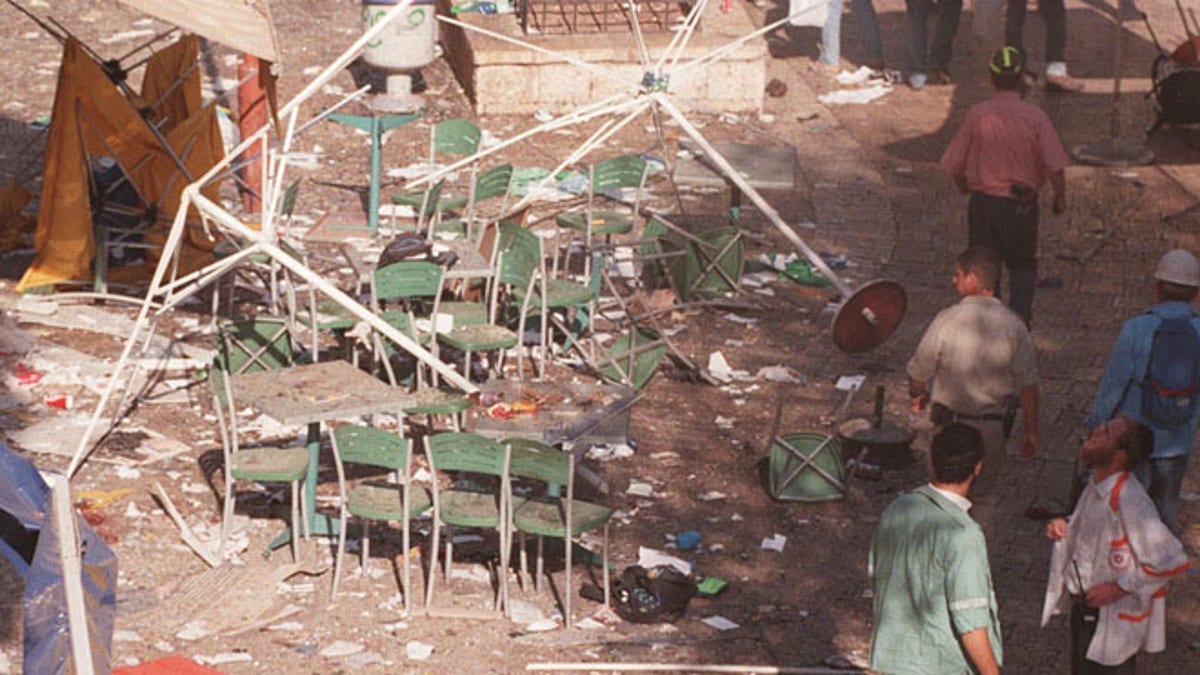
Sept. 4, 1997: Shown here is the site at Jerusalem's Ben Yehuda pedestrian mall following a triple explosion during a terror attack. (AP)
Would the U.S. government ever side with Iran?
Actually, the United States has already done so several times in an ongoing and unusual court battle -- and is likely to do so again when it files a brief with the Supreme Court.
The case involves American survivors of a 1997 Hamas suicide bombing near a Jerusalem cafe. Survivors sued the Iranian government for supporting the terrorists, and won. A D.C. District Court initially awarded them $71.5 million in damages -- to be collected from Iranian government assets held in the United States if Iran refused to pay.
But Iran appealed the ruling, and the 7th Circuit Appeals Court ruled that the plaintiffs should not be allowed to force Iran, and groups that have done business with it, to reveal Iranian assets in America. Without that information, the attack victims cannot collect the damages they were awarded.
So the plaintiffs are now asking the Supreme Court to hear their case. And their attorney, Ted Olson -- who famously represented George W. Bush in the Supreme Court case that determined the 2000 election -- said the biggest roadblock in the way of justice has been the U.S. government.
"The U.S. government is making this more difficult," Olson told FoxNews.com. "It's frustrating that our own government is taking the side of the terrorists."
Every step of the way in the legal proceedings, so far, the U.S. Justice Department has filed briefs arguing that Iran is legally correct. The department first filed the briefs during the George W. Bush administration, and the case has since fallen into the lap of the Obama administration.
U.S. Justice Department spokesman Wyn Hornbuckle declined to comment on the case for this article, but the agency's past legal filings explained its position, noting that it simply wants to see the law interpreted correctly.
"The United States files this brief because of its significant interest in ensuring that courts correctly interpret the laws," the brief reads, going on to cite the "Foreign Sovereign Immunities Act" of 1976, which makes foreign nations immune to most types of lawsuits.
The Justice Department went on to cite foreign policy reasons for filing the brief on Iran's side.
"Issues such as these ... can have a significant, detrimental impact on the conduct of our foreign relations, as well as on the reciprocal treatment in the courts of other nations," the DOJ notes.
Olson said he didn't buy that rationale.
"They're saying, 'gee whiz, we don't want to disturb relations with foreign states.' But foreign states that are adjudicated as having committed acts of terrorism, or sponsoring acts of terrorism, shouldn't be entitled to protections."
Typically, foreign governments cannot be sued in U.S. court under a principle called "sovereign immunity." But in 1996, U.S. law was amended to allow foreign governments to be sued if a court finds them guilty of supporting terrorism.
Independent legal experts noted that the amendment was passed specifically to deal with cases similar to this.
"It was amended specifically because of Jerusalem bus bombings that occurred," Roger Alford, a Notre Dame law professor who specializes in sovereign immunity law, said.
The case at hand was first filed in 2003.
"It was almost 10 years ago that we started this," plaintiff Dan Miller, who was injured in the café bombing, told FoxNews.com. "It's been a frustrating battle, to be honest. On the one hand the government and Congress gave us the ability to fight back (in court) ... And on the other hand when we go to (court) ... the government has been, I'd say, our biggest enemy."
Miller said that his desire to win the case stemmed partly from a desire to discourage Iran from supporting terror in the future.
"I think every decision -- whether you're a terrorist in Iran, or you're me in Boca Raton -- is influenced by money. And if Iran has to think, 'hey, they're not just giving Hamas $5 million, but they also stand a chance to lose hundreds of millions of dollars in assets around the world' -- I really believe that would influence them."
Miller added that it looked to him like the lawsuits might already be affecting Iran.
"This is the first time in history ... that Iran is representing themselves in court. Which means that we got their attention and they don't want this to happen."
One Iranian asset in the U.S. -- a house in Texas that had once been owned by the Shah of Iran -- was successfully seized for the plaintiffs. Miller said he and his fellow plaintiffs then sold the house back to Iran, and split the proceeds. Miller estimates that he received about $25,000 in compensation as a result.
The lawsuit also sparked controversy when the plaintiffs attempted to get a court to seize ancient Persian artifacts on loan from Iran at several museums in the U.S.
Miller said that he wouldn't feel sorry if Iran were to lose the artifacts.
"There's one simple solution to all this. If you don't want to give up the artifacts -- okay, we are asking where your money is. Pay up," Miller said.
Alford said he thinks the plaintiffs have a shot at getting the Supreme Court to take their case.
"Being optimistic is kind of tough at this point, it's been so long," Miller said. "But our lawyers are working hard. ... I think it's time for the U.S. to stand up and say, 'if you hurt one of our citizens in one of these attacks, you're going to lose your bank accounts, you're going to lose everything.'"





















